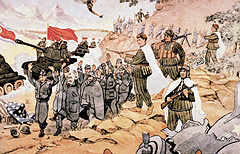Circulatory System
Cells carry out a variety of functions that are vital for our body on a daily basis.
In order to be able to carry out these functions, cells need oxygen and nutrients and to be able to eliminate waste.
They are transported through the bloodstream, travelling throughout the body, thanks to a muscular pump called a heart and a network of tubes known as blood vessels (arteries, veins and capillaries).
The heart is a hollow muscular organ located in a space called mediastinum behind the sternum, between the ribs and the lungs.
The pumping action of the heart ensures that the body’s cells receive a continuous supply of these vital elements.
Respiratory System
The organism’s cells must remain active; oxygen is needed for this end.
The respiratory system carries out this function through breathing, an involuntary process that sets in motion organs and structures known as airways (nasal cavity, pharynx, larynx, trachea, bronchi and the lungs). Blood carries oxygen from inhaled air to the tissues of the body.
At the same time, this system expels carbon dioxide from the organism.







 Termina la Guerra de Corea
Termina la Guerra de Corea